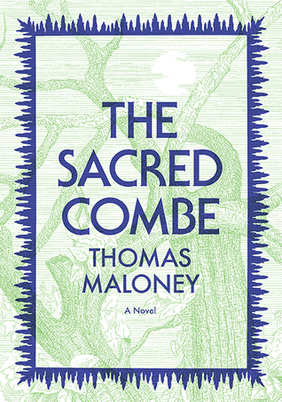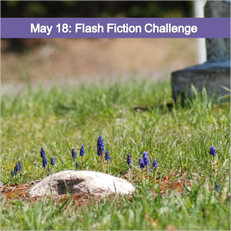| When she was about six or seven, my youngest niece was obsessed with old books. Too young to articulate what drew her to them, she would spend a quiet hour when she came to visit turning the pages of an antique volume of poetry. Thinking she might prefer something more suited to her reading age and, admittedly, anxious to preserve my small collection of old books, I offered her a modern anthology of the work of Hilaire Belloc, which she vehemently rejected. Ten years on, I wonder if she’d be the ideal reader of Thomas Maloney’s debut novel, which I received courtesy of the publisher, Scribe. |
Like the stereotypical librarian, Sam is a quiet character, somewhat passive in his failure to fight for his former wife. He seems more interested in exploring the lives of others than living his own. Through him, we discover the loves and losses of the family that has occupied the hall for over two centuries. With Sam’s unworldliness and the Gothic style of the novel reminiscent of the Brontës, including addressing the reader directly, it’s easy to similarly get lost in the past and overlook the novel’s contemporary setting.
I approached The Sacred Combe as an example of the country house novel. As outlined by Blake Morrison, these tend to deal with Englishness (although the setting is kept secret, I placed it as in one of the prettier parts of the Lake District – in contrast to the small coastal towns just beyond its border – because of the red squirrels which have disappeared from most of the rest of the country); illicit sex (only in fantasy in the contemporary relationships, but present in the history); rightful ownership (here in the question of who will inherit the hall when the current owner dies); poetry (here along with the question of whether the poet was in fact a plagiarist); shifting patterns of wealth (Sam, the banker, can easily afford to jack in his job, while the Comberbache family will struggle to pay inheritance tax); ghost stories (despite Sam’s background as a hard scientist, there’s a strong spiritual element to this novel, with characters from the past casting a strong shadow); upstairs/downstairs (well, I certainly puzzled over the position of Miss Snyder who moves between socialising with the gentry and serving them at table). But the overriding theme is completely consistent with Blake Morrison’s observation that:
What the contemporary novelist finds in country houses isn't greatness but loss, failure and everyday human struggle, writ large.
But, as the story unfolded, I realised that this isn’t the way the author hopes we’ll read it. Although the winter landscape is beautifully captured, and we’re shown the physical toll of Sam’s work (p68):
I had advanced so far down the enormous bookcase that my back began to ache from stooping, so I fetched a cushion from the window seat and continued the search on my knees. These have never been my strongest point, and they creaked audibly as I shifted my weight … Moreover, the solitary and silent nature of the work made me keenly aware of my own body: every ache, every sensation of cold or stiffness, every creak of my suspiciously creaky young bones, gnawed insistently at my consciousness
it’s very much a novel of ideas. Sam, after all, is a philosopher as well as a physicist, but it’s in the concluding chapters, with an underlined refusal to deliver the expected resolution, that this is writ large.
I wondered if there was an intentional parallel process between Sam’s search through the library for a lost letter and the reader’s search for something not quite known in books. Sam turns the pages of thousands of books, but he doesn’t read them; instead, he finds the stories in conversations with his host and other visitors to the house (and I sometimes found the thread difficult to follow because of this distancing and the recycling of names across the generations). In made me question, not just what I do and don’t like a novel but my unstated assumptions that it will be about character at some level and, if not about characters as individuals, about people as a collective in the social structures we humans create (for example, as in Lingua Franca which I reviewed earlier this month).
The Sacred Combe is not about character; that’s not to say that the people are poorly drawn, but that the questions we might have about them (such as why Sam’s wife left him and why, indeed, they married so young) aren’t addressed. Other things are, such as the fictionalisation of the life of the poet Thomas Chatterton, to whose memory Thomas Maloney dedicates the novel, but I’m left with an uncomfortable feeling of having missed the message of the symbols threaded through the text. If you like modern Gothic with a rudderless outsider as narrator, you might also enjoy After Me Comes The Flood.
| As sometimes happens, I was about to post this when the call came in for a new 99-word flash. If you click on the image, you’ll see why I had to hold back till I’d composed my story. Not only has Charli granted my wish for a squirrel prompt, she’s written a beautiful account of squirrelling around in graveyards to uncover forgotten histories, which tunes perfectly with Sam’s quest in The Sacred Combe. My response might be slightly twee, but I enjoyed meeting the challenge. |
Perched on a high branch, I watched the humans kneeling on the lawn. They might have been paying homage but for the daggers they thrust into the soil. Extracting those sunny flowers we call lion’s teeth, with their long tapering roots. I knew humans ate plants, but these were set aside to wither away.
I flicked my tail, astonished, as they tugged at tiny saplings, shiny nuts entangled in their roots. Sadness overcame me, a vision of paws ploughing through snow. My babes would have survived if I’d remembered where I’d buried our winter stores.























 RSS Feed
RSS Feed





















